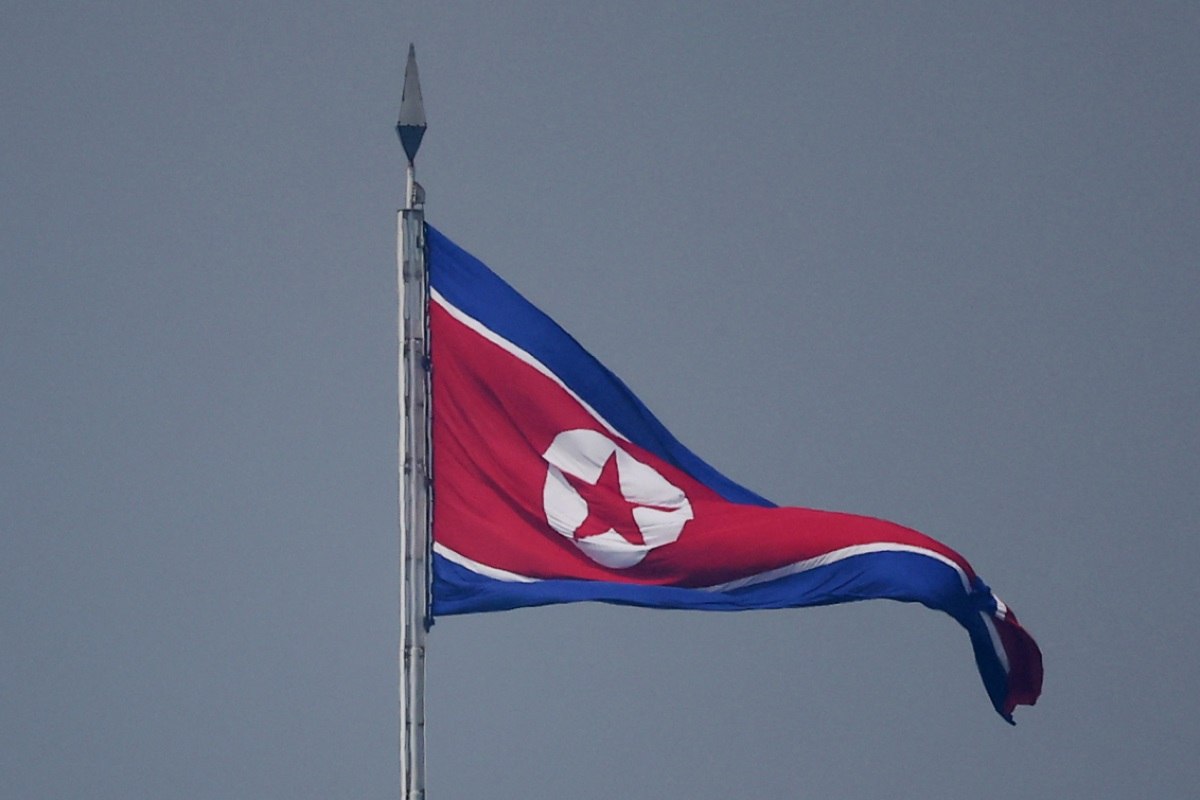
A North Korean flag flutters at the propaganda village of Gijungdong in North Korea, on July 19, 2022.
15:32 JST, January 8, 2024
SEOUL (AFP-Jiji) — North Korea conducted live-fire drills on its western coast, Seoul’s military said Sunday, the third consecutive day of military exercises near its contested maritime border with the South.
Seoul’s military said that North Korea had “conducted artillery fire with over 90 rounds north of Yeonpyeong island from 16:00 to 17:10 today.”
They accused the North of “repeated artillery fire” within a buffer zone created in 2018 under a now-defunct tension-reducing deal, saying the bombardment posed “a threat to the peace on the Korean Peninsula.”
North Korea’s military said it had carried out “maritime live-fire training” with 88 rounds of artillery but said the drills were “directionally unrelated” to the maritime border.
The exercises “did not pose any intentional threat” to South Korea and were part of the North’s “normal training system of our military,” it said in a statement carried by the official Korean Central News Agency (KCNA).
No North Korean artillery shells fell south of the Northern Limit Line, the de facto maritime border in the Yellow Sea, and no casualties were reported, according to the Yonhap news agency.
Residents on the South Korean border island of Yeonpyeong were warned to stay inside Sunday, local officials told AFP, due to the drills and any possible South Korean countermeasures.
“North Korean gunfire is currently being heard,” said a text message sent to all residents Sunday afternoon.
“Troops on Yeonpyeong Island are currently responding, but residents are advised to be careful of outdoor activities,” said the message, details of which were confirmed to AFP by local officials.
On both Friday and Saturday, North Korea fired artillery rounds in the same area — near Yeonpyeong and Baengnyeong, two sparsely populated islands situated just south of the Northern Limit Line.
On Friday, residents of the two islands were ordered to evacuate to shelters and ferries were suspended during one of the most serious military escalations on the peninsula since Pyongyang fired shells at one of the islands in 2010.
On both days, Seoul said North Korea’s shells landed in the buffer zone created under the 2018 deal, which fell apart in November after the North launched a spy satellite.
‘Deceptive operation’
North Korea said Friday that its live-fire drills that day had not even had “an indirect effect” on the border islands.
On Sunday, Kim Jong Un’s powerful sister denied Seoul’s claims that Pyongyang had fired dozens of artillery rounds near their border on Saturday, saying North Korea had instead conducted a “deceptive operation.”
“Our military did not fire a single shell into the water area,” Kim Yo Jong said in a statement carried by KCNA.
Kim claimed instead that her country’s military had detonated explosives simulating the sound of gunfire 60 times and “watched the reaction” of the South Korean forces.
“The result was clear as we expected,” she said.
“They misjudged the blasting sound as the sound of gunfire and conjectured it as a provocation. And they even made a false and impudent statement that the shells dropped in the sea buffer zone.”
The two Koreas remain technically at war because their 1950-53 conflict ended in an armistice, not a treaty, and most of the border between them is heavily fortified, with their contested maritime border never officially delineated.
Cho Han-bum, senior research fellow at the Korea Institute for National Unification, told AFP that North Korea had “transitioned into a phase of military confrontation.”
“North Korea will not engage in clear provocations like its previous shelling of Yeonpyeong Island but it will continue to escalate military tensions,” while trying to blame the South for the situation.
Relations between the two Koreas are at one of their lowest points in decades after Kim Jong Un last year enshrined his country’s status as a nuclear power into the constitution and test-fired several advanced ICBMs.
At Pyongyang’s year-end policy meetings, Kim threatened a nuclear attack on the South and called for a build-up of his country’s military arsenal ahead of armed conflict that he warned could “break out any time”.
“In the grand scheme of things, they are trying to create tension by pressuring South Korea and eventually gain an upper hand in the process of negotiating with the US while making their presence felt,” Park Won-gon, professor at Ewha University, told AFP.
Top Articles in News Services
-

Survey Shows False Election Info Perceived as True
-

Prudential Life Expected to Face Inspection over Fraud
-

Hong Kong Ex-Publisher Jimmy Lai’s Sentence Raises International Outcry as China Defends It
-

Japan’s Nikkei Stock Average Touches 58,000 as Yen, Jgbs Rally on Election Fallout (UPDATE 1)
-

Trump Names Former Federal Reserve Governor Warsh as the Next Fed Chair, Replacing Powell
JN ACCESS RANKING
-

Japan PM Takaichi’s Cabinet Resigns en Masse
-

Japan Institute to Use Domestic Commercial Optical Lattice Clock to Set Japan Standard Time
-

Israeli Ambassador to Japan Speaks about Japan’s Role in the Reconstruction of Gaza
-

Man Infected with Measles Reportedly Dined at Restaurant in Tokyo Station
-

Videos Plagiarized, Reposted with False Subtitles Claiming ‘Ryukyu Belongs to China’; Anti-China False Information Also Posted in Japan
























